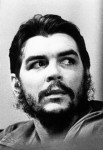 Ernesto ‘Che’ Guevara (1928-1967) was an Argentinian doctor, writer and socialist revolutionary. Guevara was best known for fighting alongside Fidel Castro during the Cuban Revolution. Born in Rosario, Argentina, Guevara’s father was a successful builder and draftsman, while his mother came from a wealthy family of landowners. In 1932 the family moved to Alta Gracia, believing the elevated climate might be beneficial for Ernesto’s asthma. Ernesto Guevara became a curious teenager with interests in politics, economics, psychology and philosophy. He abandoned plans to become an engineer, graduating instead with a medical degree from the University of Buenos Aires. During his studies, Guevara took long motorcycle trips around South American countries. These trips gave Guevara some insight into the continent’s poverty, corruption and exploitation of labour. His work as a doctor further exposed him to the poor, whose sufferings Guevara attributed to oppressive South American governments backed by US capitalist interests.
Ernesto ‘Che’ Guevara (1928-1967) was an Argentinian doctor, writer and socialist revolutionary. Guevara was best known for fighting alongside Fidel Castro during the Cuban Revolution. Born in Rosario, Argentina, Guevara’s father was a successful builder and draftsman, while his mother came from a wealthy family of landowners. In 1932 the family moved to Alta Gracia, believing the elevated climate might be beneficial for Ernesto’s asthma. Ernesto Guevara became a curious teenager with interests in politics, economics, psychology and philosophy. He abandoned plans to become an engineer, graduating instead with a medical degree from the University of Buenos Aires. During his studies, Guevara took long motorcycle trips around South American countries. These trips gave Guevara some insight into the continent’s poverty, corruption and exploitation of labour. His work as a doctor further exposed him to the poor, whose sufferings Guevara attributed to oppressive South American governments backed by US capitalist interests.
In 1955 Guevara met Fidel Castro and decided to join Castro’s struggle to overthrow the Batista government in Cuba. He arrived in Cuba in late 1956, offering to serve as a doctor but becoming involved as a military commander. After the successful 1959 revolution, Guevara was granted Cuban citizenship and became one of Castro’s most trusted lieutenants. He held several important positions and provided advice on everything from military strategy to land reform and foreign relations. Guevara’s profile was also increased by foreign journalists, who romanticised him as a daring but idealistic and intelligent revolutionary. In 1960 he undertook a global tour of communist countries, visiting the Soviet Union, East Germany and the People’s Republic of China. In 1961-62 ‘Che’ advised Castro to accept the installation of Soviet missiles in Cuba, a decision that led to the Cuban missile crisis.
In 1965 Guevara resigned all his government positions in Cuba and vanished from public life. He later appeared in central Africa, supporting and advising revolutionary movements in the Congo. This mission failed and Guevara left the Congo in late 1965, spending several months living incognito in Africa and Europe. In November 1966 ‘Che’ arrived in Bolivia, having agreed to form a revolutionary army there. In October 1967 he was captured, tortured and executed by Bolivian government forces, acting with the support of CIA operatives. Guevara’s death drew mixed reactions around the world. In Cuba, ‘Che’ was mourned as a hero while students, socialists and liberals elsewhere praised him as an inspirational warrior for freedom and economic equality. Most Western politicians and conservatives, however, celebrated the demise of a man they considered a murderous revolutionary.
Content on this page is © Alpha History 2018-23. This content may not be republished or distributed without permission. For more information please refer to our Terms of Use.
This page was written by Jennifer Llewellyn and Steve Thompson. To reference this page, use the following citation:
J. Llewellyn & S. Thompson, “Ernesto ‘Che’ Guevara”, Alpha History, accessed [today’s date], https://alphahistory.com/coldwar/che-guevara/.
